
EDUCATION
Green BEE Competition
We have recently restarted our ‘Green BEE’ competition for the 7th year, launched in partnership with the Hampshire & Isle of Wight Wildlife Trust in 2023. Created to help raise awareness about the importance of the natural world amongst children in the community.
2023 Competition
This years competition gave entrants the chance to win £1,000 to create an environmental space that will enhance their school or neighbourhood. We engaged with over 19 local schools and received a total of 7 entries – each proposing a unique idea to create places that felt fresher, healthier and wilder, to support both people and nature.
We are pleased to announce the two winners, William Gilpin School in Boldre, and Hounsdown School in Totton.
The winning projects captivated the judges with their innovative and eco-conscious designs. William Gilpin School's project, the 'Chill Zone,' emerged as the primary school category winner. The 'Chill Zone' will provide a tranquil outdoor space where young pupils can unwind and connect with nature. In addition, it will serve as a sanctuary for local bugs, hedgehogs, and birds, creating a unique new ecosystem within the school grounds.
The secondary school category winner, Hounsdown School, secured victory with their 'School Garden' project. This initiative aims to enhance biodiversity on school grounds by introducing new habitats for local wildlife and planting 30 trees, donated by the Woodland Trust.
Entries were assessed by Rob Flower, Managing Director of New Milton Sand and Ballast, and a panel of judges – including Cllr Fran Carpenter from Hampshire County Council, Gill Perkins, CEO of the Bumblebee Conservation Trust, Bob Lord, Chairman of Friends of Ballard Water meadow, Craig Whitelock, Engagement Officer at Hampshire & Isle of Wight Wildlife Trust and previous Green BEE winner Alice Gardiner, Deputy Head of Humanities at The Arnewood School. The judges marked project proposals against five key criteria: evidence of research and exploration, a strong message and aims, the benefits of the proposal, innovation and creativity, and workability and aftercare plans.
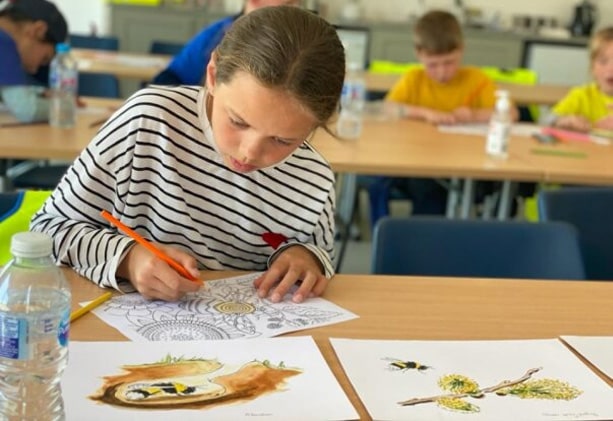
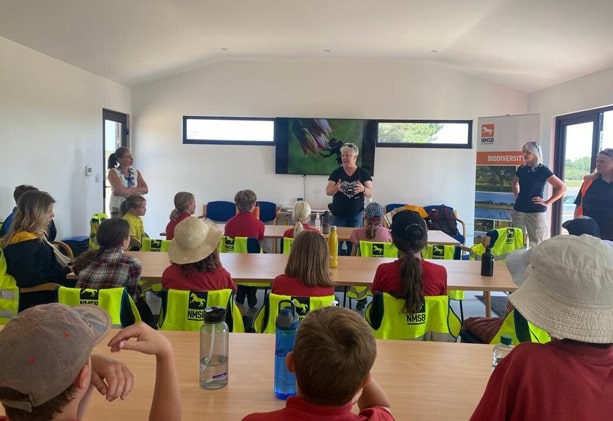
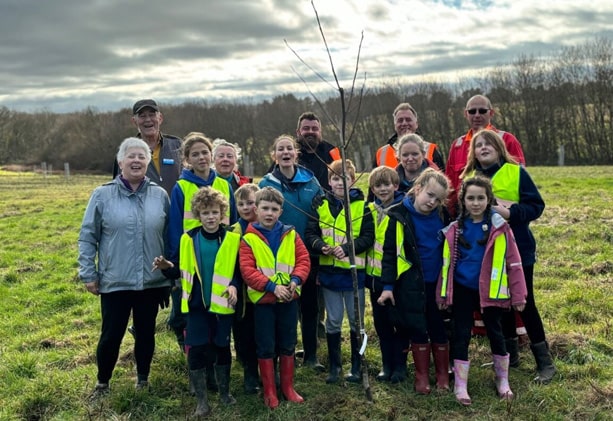
LOCAL SCHOOLS & COLLEGES
We have toured many primary and secondary students around our sites over the years. Enabling them to learn about the life cycle of a quarry, the products produced from our extraction process, and the important restoration works and biodiversity that we create.
Ballard School now uses our Downton Manor Farm as a case study for their GCSE project work. Looking specifically at sustainability.
We run annual wildlife projects at our restored lakes at Downton Manor Farm Quarry in partnership with the Bee Conservation, to educate local primary students about the importance of wild bees, their habitats, and the different species we have in the area.
If you would like to get involved with our education programme, please contact us at info@nmsb.co.uk.
WORK EXPERIENCE
We have an extremely diverse company. This provides not only opportunity to develop within the department you are part of, but also transfer throughout the business.
From working with large construction machinery, raw materials, gaining health and safety qualifications, being involved with the restoration and biodiversity of our quarries, training in sales and marketing, gaining management qualifications, or becoming a fully qualified accountant.
We are happy to take on work experience students from any of the local schools and colleges. Please contact us at info@nmsb.co.uk.
Toby our Apprentice Materials Technician has a great experience to share from initially joining us in 2018 for his year 10 work experience whilst he was still studying at Arnewood School. Dreaming of a career as a palaeontologist, when it came to looking for work experience, the lack of local dinosaurs posed an issue, so he and his Dad agreed that NMSB and its link to excavating materials and the restoration programmes we deliver, may be the next best thing.
During his two weeks with us, Toby worked with many departments but the one that he most enjoyed was in our technical department. Everything we produce must be tested to make certain we conform to the relevant standards. This involves sampling, lab trials and testing, along with creating specific concrete mixes, carrying out audits, and product development.
Toby commented:
“I might not be working with the dinosaurs I dreamed of, but I am working with the materials that preserved them for thousands of years. I am really enjoying my work and can’t wait for our brand new lab to be finished at New Milton. By continuing to learn and grow with the company, I can totally see my future here progressing hopefully to Technical Manager one day.”
Becoming an apprentice or trainee in the building materials industry, really is a great place to start and continue your career.
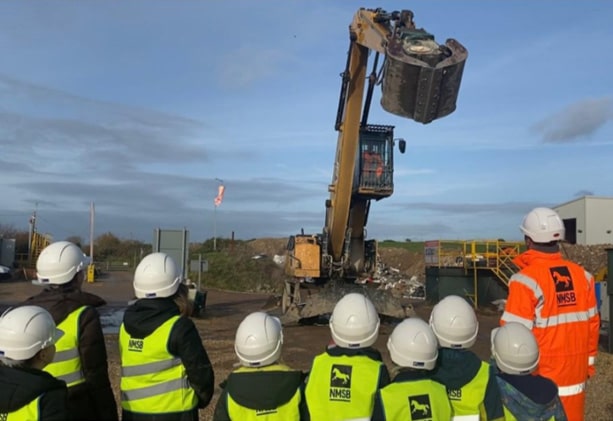
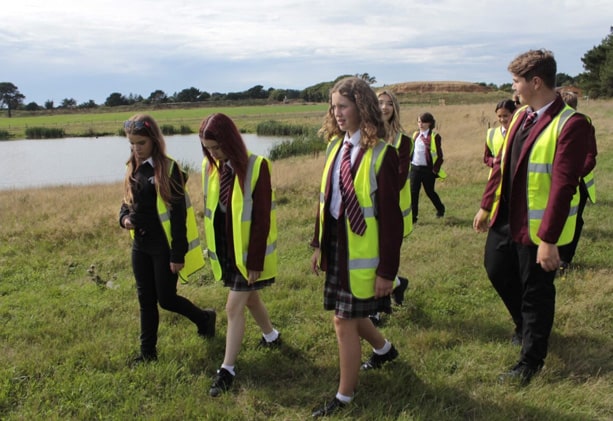
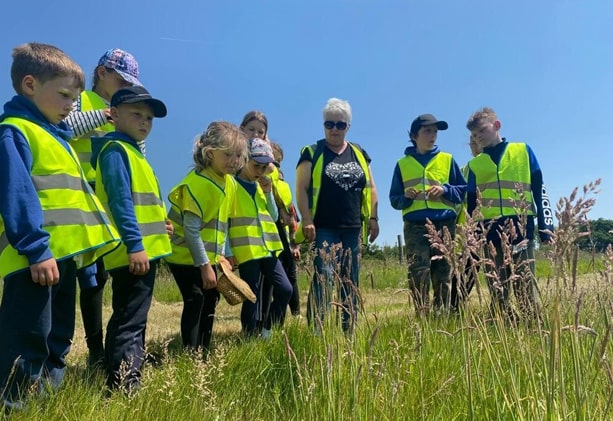
PRESERVING OUR PAST
Our history is very important to us, the quarrying industry plays a vital part in today’s economy, but also allows us to dig deeper into the past and often make discoveries that would have remained unfound were it not for excavation.
Between 1999 and 2003, we funded an archaeological programme investigating Iron Age/Early Roman Salt Workings in Lymington. It was discovered that salt production was a seasonal activity, and small groups would likely have gathered on the marshes in summer, making temporary homes for the season whilst the heat of the sun helped to speed up the evaporation process.
Archaeologists were able to prove that by the fifteenth century, the small-scale businesses had ceased producing, however salt workings continued in the sixteenth century on a commercial scale. Over time, the landscape of the salt marshes has changed many times, and the introduction of lakes we have created is a haven for wildlife.
The excavation also uncovered a maze of pits and ditches, the earliest of which were the remains of Late Iron age/Early Roman and medieval salt production. Although archaeologists had found evidence of Iron Age (700 BC – 43 AD) salt production in Hampshire before now, they had not found the structural remains that help explain how the salt was produced.






